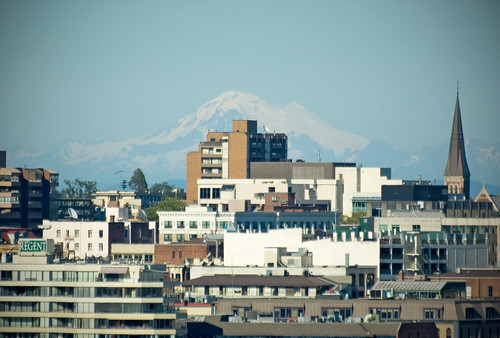This afternoon, a brilliantly clear sunny day, my dog Jigger and I walked up to Moss Rock Park, right up the “summit,” to survey our surroundings. Well, ok: I surveyed; he sniffed about.
Moss Rock is one of our local treasures: you can climb up here to savor the multimillion dollar views, gorging yourself silly on the beauty that stuns the senses in ways familiar to Odysseus – who had himself strapped to the mast of his ship to resist siren songs. Odysseus, who was also fair canny about lotus leaves.
As I sat surveying, I wondered about the gorgeous ocean view on three sides and its literally spell-binding effect. Then I turned my back on the sea and looked at the city instead.
I haven’t worked this out, but it struck me that imagination can get blinded by this place: beautiful ocean vistas and incomparable topography – steep, stony eruptions of land, chthonic reminders of how this place was shaped – and irrepressible vegetation.
There’s no doubt that people spend a lot of time marveling at, weeping over, and basking in the natural beauty that’s simply given to every single person here. I would argue that, collectively, we spend a lot of time staring at it.
I want to say this simply, but I’m having a hard time with it. What struck me was this: our gaze is turned to the immutable too much, at the expense of what can and must be mutable: the city. We’re not building our city. We’re all trying to find our place in this beauty, perhaps trying to secure our little piece of it – as if it were ours to secure – but we’re not giving much back. We’re kind of indifferent about building a beautiful city – we suffer sprawl, but don’t want to compete with nature when it comes to building up our downtown. We stare at the majesty of nature – do we “honor” it by keeping our city abject and unambitious? We stare at nature, enthralled, but we’re not staring at the city. We should be staring at the city, too. We’re not building a city that rivals the (natural) beauty we’re given. We sit on summits to survey what’s out there – the ocean, the sunset, the rocks – and if we’re feeling frisky, we bike along the scenic route to survey our bounty from sea level. But doing so, we’ve turned our backs (literally) on the city.
In Dream City: Vancouver and the Global Imagination, Lance Berelowitz described how Vancouver’s setting shaped its brand of urbanism. In the years since reading his book, I’ve wondered about Victoria. Today, it struck me that our island setting persuades us to look out – at the sea that surrounds us on all sides, for example – and that this looking out blinds us to looking in constructively, with a builder’s eye, looking back in on the city, on the downtown that we’ve learned to ignore. Sure, we keep the tourist areas on life support, but as for the rest?
